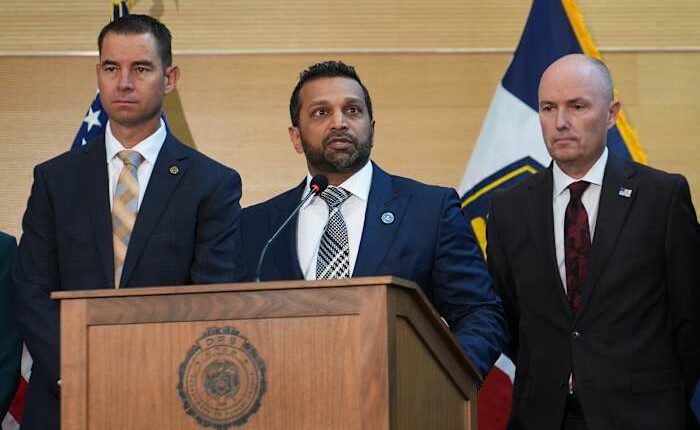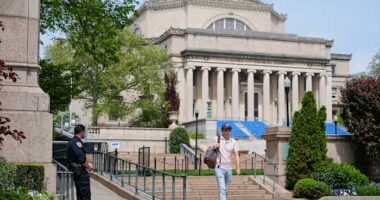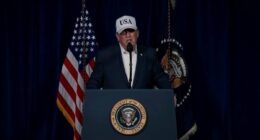Share this @internewscast.com

WASHINGTON – Not long after conservative activist Charlie Kirk was assassinated, FBI Director Kash Patel announced online that the suspect in the case was in custody. However, the actual shooter was not among those detained. Two men who were briefly held were soon released, with Utah authorities admitting that the gunman was still free.
This premature declaration was more than a mere mistake. It underscored the significant doubts surrounding Patel’s leadership of the FBI at a time when both his personal credibility and the bureau’s are facing intense scrutiny.
Patel is heading into upcoming congressional oversight hearings not only needing to address this investigation but also confronting broader concerns about his capability to bring stability to a federal law enforcement agency that is currently disrupted by political disagreements and internal chaos.
Democrats are expected to question Patel about the dismissal of senior officials, which has led to a lawsuit, his ongoing pursuit of former President Donald Trump’s grievances despite the conclusion of the Russia probe, and the resource shift prioritizing illegal immigration and street crime—areas traditionally overshadowed by the bureau’s focus on complex threats like espionage and corruption.
Additionally, there are concerns about the handling of the Jeffrey Epstein sex trafficking files, the appointment of a second deputy director to work alongside Dan Bongino, and the recent use of polygraphs on agents to find leak sources. Meanwhile, Republicans are anticipated to stand by Patel or redirect attention to the bureau’s critics.
The hearings represent Patel’s most critical platform to date and potentially the best opportunity to prove to the nation that he can steer the FBI clear of further errors amid a period of political unrest and growing mistrust.
“Because of the skepticism that some members of the Senate have had and still have, it’s extremely important that he perform very well at these oversight hearings” on Tuesday and Wednesday, said Gregory Brower, a former FBI executive who served as its top congressional affairs official.
The FBI declined to comment about Patel’s coming testimony to the committee.
He claimed the subject was ‘in custody’
Kirk’s killing was always going to be a closely scrutinized investigation, not only because it was the latest burst of political violence inside the United States but also because of Kirk’s friendships with Trump, Patel and other administration figures and allies.
While agents from Salt Lake City investigated, Patel posted on X that “the subject for the horrific shooting today that took the life of Charlie Kirk is now in custody.” Utah Gov. Spencer Cox said at a near-contemporaneous news conference that “Whoever we did this, we will find you,” suggesting authorities were still searching. Patel soon after posted that the person in custody had been released.
“That does not deliver the message that you want the public to hear,” said Chris O’Leary, a retired FBI counterterrorism executive. “It had the opposite effect. People start to wonder what is going in. This looks like the Keystone Cops and it continues to get worse.”
The next day, a scheduled afternoon news conference was canceled for “rapid developments” as Patel and Bongino flew to Utah. It was held instead in the evening. Patel appeared but did not speak.
As the search stretched on for over a day, Patel vented on a call with FBI personnel Thursday about what he perceived as a failure to keep him informed, including that he was not quickly shown a photograph of the suspected shooter. That’s according to two people familiar with the matter who were not authorized to discuss it by name and spoke on condition of anonymity to The Associated Press. The New York Times earlier reported details of the call.
On Friday morning, authorities announced the arrest at a news conference where Patel claimed credit for certain investigative steps, saying that, “At my direction, the FBI released the first set of FBI photos.”
Asked about the scrutiny of his performance, the FBI issued a statement saying that it had worked with local law enforcement to bring the suspected shooter, Tyler Robinson, to justice and “will continue to be transparent with the American people.”
Patel’s overall response did not go unnoticed in conservative circles. One prominent strategist, Christopher Rufo, posted on X that it was “time for Republicans to assess whether Kash Patel is the right man to run the FBI.”
Then there’s the personnel purge
On the same day Kirk was killed, Patel faced a separate problem: a lawsuit from three FBI senior executives fired in an August purge that wiped away decades of institutional experience and that they characterized as a Trump administration retribution campaign.
Among those fired was Brian Driscoll, who as acting FBI director in the early days of the Trump administration resisted Justice Department demands for names of agents who investigated the Jan. 6, 2021, riot at the Capitol. Driscoll alleged in the lawsuit that he was let go after clashing with Patel over administration demands to fire an FBI pilot who’d been wrongly identified on social media as the case agent in the classified documents investigation of Trump.
The lawsuit quotes Patel as having told Driscoll his job depended on firing people the White House wanted gone. The FBI has declined to comment on the lawsuit.
The other plaintiffs are Spencer Evans, a former top agent in Las Vegas whose termination letter cited a “lack of reasonableness and overzealousness” in implementing COVID-19 policies as a human resources official — a claim his lawyers call false — and Steve Jensen, who helped oversee FBI investigations into the Jan. 6. Capitol riot.
The upheaval continues a trend that began before Patel took over, when more than a half-dozen senior executives were forced out under a Justice Department rationale that they could not be “trusted” to implement Trump’s agenda.
There’s since been significant turnover in leadership at the FBI’s 55 field offices. Some left because of promotions and planned retirements, but others because of ultimatums to resign or accept new assignments. The head of the Salt Lake City office, an experienced counterterrorism investigator, was pushed out of her position weeks before Kirk was killed at a Utah college, said people familiar with the move.
In July, an agent based in Norfolk, Virginia, Michael Feinberg, authored a first-person account saying he was told to brace for a demotion and a polygraph exam because of his friendship with Peter Strzok , a lead FBI agent in the investigation into ties between Russia and Trump’s 2016 campaign fired over derogatory text messages sent about Trump. Feinberg resigned.
FBI’s priorities shift under Patel
Patel arrived at the FBI having been a sharp critic of its leadership, including for inquiries into Trump that he says politicized the institution. Under Patel and Attorney General Pam Bondi, the FBI and Justice Department have become entangled in their own politically fraught investigations, such as the one into New York Attorney General Letitia James.
He’s moved quickly to remake the bureau, with the FBI and Justice Department working to investigate one of the Republican president’s chief grievances — the years-old Trump-Russia investigation. Trump calls that probe, which did not establish a criminal conspiracy between Russia and Trump’s campaign, a “hoax” and “witch hunt.”
The Justice Department appeared to confirm in an unusual statement that it was investigating former FBI Director James Comey and former CIA Director John Brennan, pivotal players in the Russia saga listed by Patel in a book he authored as “members of the Executive Branch Deep State,” but did not say for what. Bondi has directed that evidence be presented to a grand jury, and agents and prosecutors have begun requesting information and interviews from former officials related to the investigation, according to multiple people familiar with the outreach.
Critics of the fresh Russia inquiry consider it a transparent attempt to turn the page from the fierce backlash the FBI and Justice Department endured from elements of Trump’s base following their July announcement that they would not be releasing any additional documents from the Epstein investigation.
Patel has meanwhile elevated the fight against street crime, drug trafficking and illegal immigration to the top of the FBI’s agenda, in alignment with Trump’s agenda.
The FBI has been key to the federal government’s takeover of the Washington police department, participating with partner agencies in arrests for crimes, like drunken driving, not historically thought of as central FBI priorities.
The bureau makes no apologies for aggressive policing in American cities the Trump administration contends have been consumed by crime. Patel and Bongino have been promoting the number of arrests involving federal law enforcement in an initiative they dub Operation Summer Heat. Patel says the thousands of cumulative arrests, many of them immigration-related, are “what happens when you let good cops be good cops.”
But some are concerned the street crime focus could draw attention from the sophisticated public corruption and national security threats for which the bureau has long been primarily, if not solely, responsible for investigating. In one example, a federal corruption squad in Washington was disbanded this past spring.
“One of the big problems that I see is that the investigative programs that have been hurt the most this year are the ones that really only the FBI does, or the FBI does better than anybody else,” said Matt DeSarno, who retired in 2022 as head of the Dallas field office.
Copyright 2025 The Associated Press. All rights reserved. This material may not be published, broadcast, rewritten or redistributed without permission.










